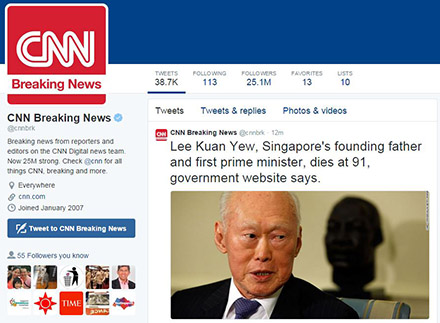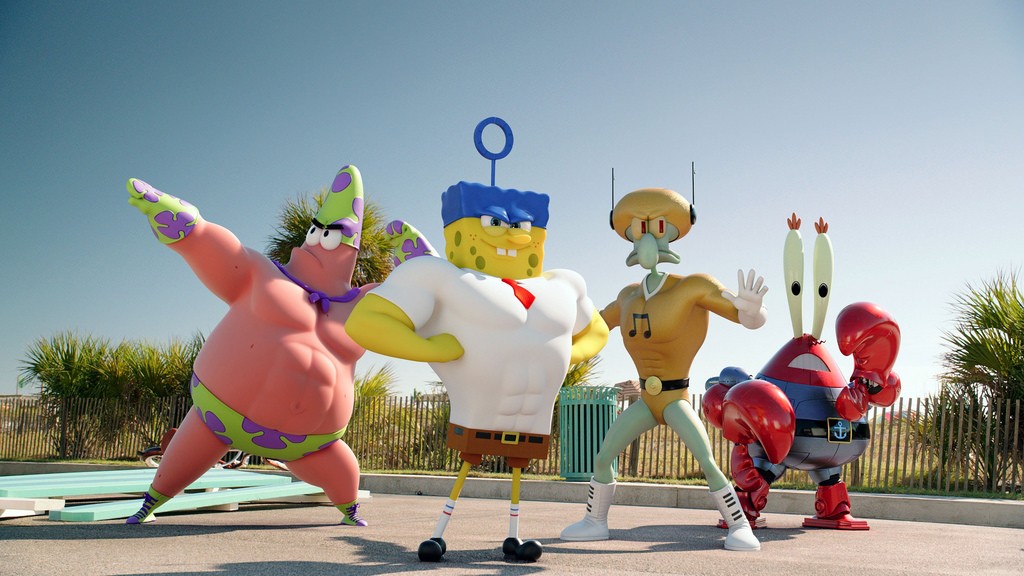CNN and CCTV incorrectly reported on the death of Lee Kuan Yew to be the first to break the news. But in the race to be first, both lost credibility with readers.
The founding prime minister of Singapore and also the nation’s longest-serving parliamentarian, Mr. Lee Kuan Yew, passed away peacefully at the Singapore General Hospital on March 23, 2015, at 3.18 a.m. He was 91.
News on Lee’s admittance to the hospital took place about a week earlier, with the prime minister’s office (PMO) issuing regular updates on an almost daily basis as his health deteriorated. All the local news media agencies and many foreign media agencies were monitoring Lee’s health closely during the period.
Lee is a prominent public figure both locally and in the global arena. Former Presidents of the United States Bill Clinton and George H.W. Bush called him a “remarkable leader and statesman” and “one of the brightest and most effective world leaders that I have ever known” respectively.
On March 18, a doctored photograph circulated on the Internet showing the PMO Web site declaring the passing of Lee.
It was later proven to be false. None of the local media jumped the gun on this. But several international news agencies, in their bids to be the first to break the news, went ahead to break the false news of Lee’s passing without verification with the PMO.

The most noteworthy offenders were CNN and CCTV, two news organisations that represented the two most powerful nations in the world, the United States and the People’s Republic of China respectively.

Why did they do that?
Is it because Singapore is a small country to which neither news organisation gives much thought?
That isn’t likely, otherwise they would not be monitoring Lee’s health in the first place.
Rather, I think it’s sloppy journalism in this digital age where it gets harder and harder to be the first to break any news when you are competing with millions of citizen journalists on social media platforms like Twitter and Facebook.
If it seems 90% real, just go with it. Trust your news instinct. There is just not enough time to do too much fact checking if you are competing on social media.
Think again.
Does it matter to the audience anymore which news organisation broke a commonly expected news item like Lee’s passing?
The man was 91 and in ill health. At some point, it was bound to happen and there would be an official announcement, as with the passing of any other world leaders.
Do you remember which news organisation first broke the news of Nelson Mandela’s passing? Does it even matter?
The audience was expecting it and most news organisations, especially the Singapore media, were prepared for the reporting work, which needed to be done in the aftermath.
For a news item like this, speed no longer mattered but the quality and depth of the stories that came thereafter did. Social media and the Internet will quickly equalise any advantage a news organisation has over others in breaking an “expected” news story.
When Lee passed away on March 23, I was back in a navy camp doing my annual soldiering duty, which is required for all Singapore-born males. I had limited access to news media due to poor Internet connectivity in the camp. One of my camp mates texted a message on Lee’s passing to everyone else on duty that night.
After the first hoax incident, I needed to verify and confirm the news first. I checked the Straits Times Web site and the PMO Web site as CNN and CCTV could not be trusted anymore.
Trust once broken takes a long time to restore.
The digital age and social media have collectively taken away the prestige of being the first to break the news.
Maybe it’s time to rethink the concept of “breaking news.”












I would say Thank God for the emergence of the social media. Despite the trivial the social media produces we also get more accurate and quicker reporting then from the more established media. Crowd sourcing whether it is news or views is an exciting option for the interested.